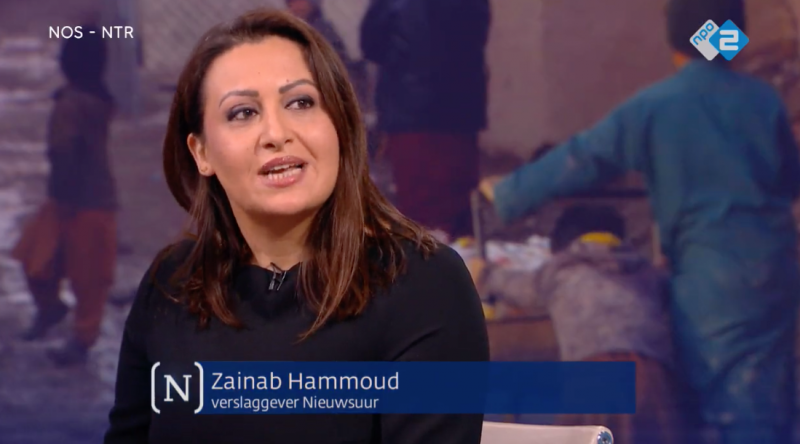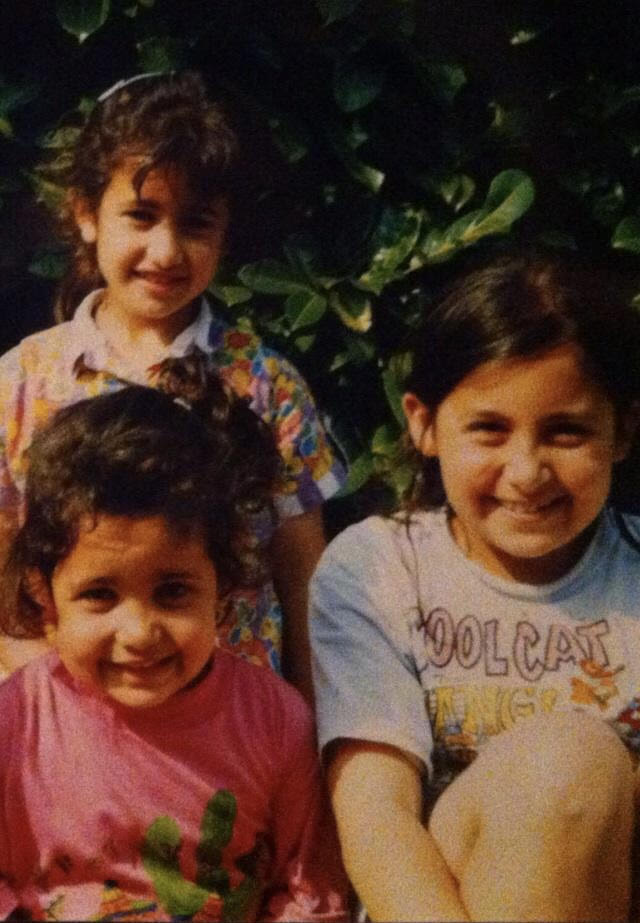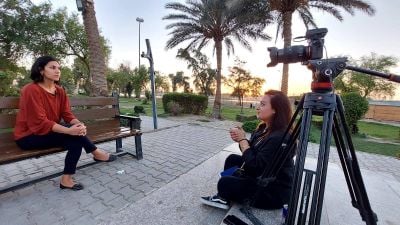
Zainab Hammoud live in the studio of the Dutch current affairs program Newshour discussing her latest report on Afghanistan on Jan 2 2023 (Photo courtesy of Zainab Hammoud)
NIJMEGEN, The Netherlands — Zainab Hammoud is shivering. The streets in The Netherlands are lightly blanketed with snow, after a bizarrely mild Christmas. The weather is one of the many things that separate Hammoud’s two homes — people are swimming in the seaside South Lebanon city of Sour, where the 34-year-old was born.
Hammoud recently returned from Afghanistan where she filmed a few segments for Nieuwsuur — the Dutch equivalent of the BBC’s “Newshour,” arguably the most important in-depth journalistic TV program — where she has been working as the Middle East editor and reporter since 2019. She’s already planning her next reporting trip to Iraq, which she visited four times last year.
How did this Lebanese-Dutch woman go from Sour to the suburbs of Utrecht to reporting from all over the Middle East — and other places in the world? Did her Lebanese background influence her career choice?
Although immigration from Lebanon to the Netherlands has been relatively minimal compared to other European countries like France and Sweden — the latest official numbers of the Dutch Central Bureau of Statistics date back to January this year and point to around “8.969 Dutch people with a Lebanese migration background” — the country is not absent from the Dutch collective consciousness. After the 2020 Beirut port explosion, the Dutch public raised around 11.5 million euros in less than 14 hours — quite impressive for a country of 17 million people with no historical ties to Lebanon.
Hammoud says her parents, who fled Lebanon towards the end of the 1975-90 Civil War, chose the Netherlands as a place to start a new life, rather than places with larger Lebanese communities, because they wanted to get as far away from the horrors of the Civil War as possible, which also meant insulating themselves from people referencing it all the time. Hammoud was just a toddler when she embarked on the life-defining journey from Sour to a country that could not be more different. “My parents just wanted to leave everything behind and start completely anew. Which, back then, was possible in a country like The Netherlands.”
From that moment on, Hammoud says, she lived in two different worlds. “My family home looks like any home in Lebanon — from the furniture to the decoration on the walls to the music, from the moment you enter our house you might as well be in Lebanon,” she says. In the morning, you’re met with the scent of freshly brewed Arabic coffee and accompanied by the sounds of Fairouz, she says. “Even the coffee has to be Najjar brought back from Lebanon. They sell Najjar here but my parents insist it doesn’t taste as good.”
Hammoud and her three sisters always spoke Arabic at home but were otherwise fully immersed in Dutch life outside. This led to them having a blended identity – which Hammoud doesn’t see as a burden at all. “I never really understood this idea of a mixed identity being some sort of massive weight you carry on your shoulders,” she says. “If anything, I feel proud and lucky to be both Lebanese and Dutch. I get to partake in two cultures, speak and understand both languages … imagine how great it is to have a sense of humor and understand jokes in two languages!”
“Me and my three sisters have mixed the two cultures, quite literally. We even speak a mix of both languages amongst ourselves — to a point where some words are a combination, such as a Dutch prefix and a Lebanese verb.”
 Zainab Hammoud with her two sisters visiting Sour in the summer of 1997 (Photo courtesy of Zainab Hammoud)
Zainab Hammoud with her two sisters visiting Sour in the summer of 1997 (Photo courtesy of Zainab Hammoud)
While this balancing act was normal to Hammoud and her sisters, when she had just finished the first year of high school, her parents decided to move the family back to Sour. “The idea of going back was always in the back of their mind. It was hard for them to see that, for instance, our Arabic wasn’t as fluent as they would’ve wanted, they saw a part of our Lebanese identity slip away. And to them, The Netherlands wasn’t their home and never would be. Even though to us, me and my sisters, it was. Both countries were,” Hammoud says.
She enrolled in high school in Sour, which, she says, was a wonderful experience because she had a great class. “People were so welcoming, even though I was different. In The Netherlands, when you’re different in school, kids can be quite mean. But I was welcomed with open arms. To this day, I’m still good friends with many of my classmates.”
Although she didn’t write or read Arabic, she managed to learn to do both well enough in three months to pass her brevet exams with flying colors, she says. In true Lebanese fashion, this led to the humorous situation where one of her classmates scored lower than her in their Arabic exams and was subsequently referred to as “the Dutch guy” for the rest of the year. She smiles at the recollection. “I had a great time here.”
Due to her good grades, everyone expected her to study medicine at the American University of Beirut, “as all good girls with good grades are supposed to do.” But she had been toying with the idea of studying journalism for a while. Then the 2006 war happened. She remembers having to assemble at the Rest House in Sour to be evacuated to The Netherlands, like many others holding a non-Lebanese nationality.
“When I spotted those Dutch journalists in Sour, amidst all the chaos, it dawned on me that they had come all the way from The Netherlands to witness with their own eyes what was happening and report on it … I was so mesmerized that I thought: Okay that’s it, I want that,” Hammoud says. “That’s the exact moment I knew for a fact that I was going to be a journalist.”
So she forewent studying medicine on the country’s most beautiful campus — although she did go back for a study abroad program at AUB — and enrolled at journalism school in The Netherlands.
Working in The Netherlands was not always a walk in the park, Hammoud says. “No matter how Dutch I consider myself to be, not everyone sees it that way and there have been moments when I thought, I’m done, I’m leaving,” she says. “But no matter how you spin it, The Netherlands is my home. And the past few years I’ve fully committed to having a career in The Netherlands, which, in retrospect, turned out pretty well, I think.”
She still goes back to Lebanon at least once a year. “I always say I am Dutch with Lebanese roots. I have two homes. And I am two Zeinabs; Lebanese Zeinab and Dutch Zeinab. And they live together in peace.”
